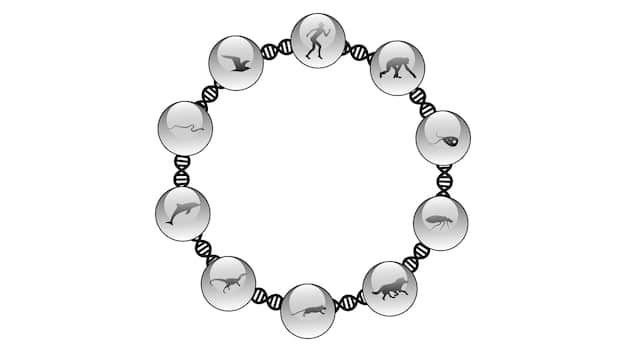Ethical Gene Editing: Societal Concerns and Scientific Implications

The ethical implications of gene editing are profound and multifaceted, sparking debates about the morality, safety, and societal impact of altering the human genome and other organisms.
The ability to modify genes, once a staple of science fiction, is now a tangible reality. But with great power comes great responsibility. The ethical implications of what are the ethical implications of gene editing? A discussion of the science and societal concerns demand careful consideration as we navigate this groundbreaking technology.
Understanding the Science of Gene Editing
Gene editing is a revolutionary technology that allows scientists to make precise changes to an organism’s DNA. This has potential benefits for treating diseases, improving crop yields, and even eradicating genetic disorders. However, the power to alter the building blocks of life also raises profound ethical questions.
Gene editing technologies, such as CRISPR-Cas9, operate like molecular scissors, precisely targeting and modifying specific DNA sequences. This capability opens doors to correcting genetic defects, developing new therapies, and enhancing traits in various organisms. However, the accessibility and relative simplicity of these technologies have also amplified ethical debates concerning their potential misuse and unintended consequences.
The CRISPR-Cas9 Revolution
CRISPR-Cas9 has dramatically simplified gene editing. This technology allows scientists to target specific DNA sequences with unprecedented accuracy.
The CRISPR-Cas9 system consists of two key components: the Cas9 enzyme, which acts as a pair of molecular scissors to cut DNA, and a guide RNA molecule, which directs the Cas9 enzyme to the precise location in the genome that needs to be edited.
- Precision: CRISPR-Cas9 allows for highly targeted changes to DNA.
- Efficiency: The system is relatively easy to use and can be applied to a wide range of organisms.
- Accessibility: The technology is becoming increasingly accessible to researchers worldwide.
CRISPR-Cas9 has revolutionized gene editing, but its accessibility also underscores the need for stringent ethical guidelines. As the technology evolves, understanding its mechanisms becomes crucial to navigate its ethical implications responsibly.
Ethical Concerns Surrounding Human Germline Editing
One of the most hotly debated areas of gene editing is its potential application to the human germline – that is, making changes to DNA that are passed on to future generations. This raises significant ethical concerns about the long-term consequences for the human gene pool.
Germline editing differs fundamentally from somatic cell editing, which involves modifying genes in non-reproductive cells, and the changes are not inherited. Germline modifications, on the other hand, alter the DNA of sperm, eggs, or early embryos, leading to heritable changes that can affect future generations. This prospect introduces unique ethical challenges regarding the potential for unintended consequences and the alteration of the human gene pool.
The Slippery Slope Argument
Critics argue that germline editing might pave the way for non-therapeutic enhancements, potentially leading to a society where genetic modifications are used to create “designer babies.”
This argument hinges on the concern that once germline editing is accepted for therapeutic purposes, the line between therapy and enhancement may become blurred. This could lead to pressure to use gene editing for non-medical reasons, such as enhancing physical or cognitive traits, potentially exacerbating social inequalities.
- Unintended Consequences: The long-term effects of altering the human germline are unknown.
- Social Inequality: Access to gene editing technologies could exacerbate existing disparities.
- Eugenics: Some worry about a return to eugenic practices, where genetic traits are selected for or against.

The potential for a slippery slope demands careful regulation and public dialogue. As we develop these powerful technologies, we must ensure that they are used responsibly and ethically, with consideration for the long-term implications for humanity.
The Potential for Therapeutic Applications
Despite the ethical concerns, gene editing holds immense promise for treating and even curing genetic diseases. This potential benefit must be weighed against the risks when considering the ethical implications.
Gene editing offers the potential to correct genetic defects at their source, providing permanent solutions for diseases such as cystic fibrosis, sickle cell anemia, and Huntington’s disease. Unlike traditional treatments that manage symptoms, gene editing aims to address the underlying genetic causes, potentially revolutionizing medical care.
Targeting Genetic Diseases
Gene editing could eliminate the burden of inherited diseases, dramatically improving the quality of life for affected individuals and their families.
The potential to alleviate suffering and improve health outcomes is a strong ethical imperative. By targeting specific genetic mutations, gene editing could prevent the transmission of hereditary diseases to future generations, providing a lasting benefit.
- Curing Diseases: Gene editing offers the potential to cure previously incurable genetic diseases.
- Improved Quality of Life: Individuals with genetic disorders could lead healthier, more fulfilling lives.
- Preventing Transmission: Gene editing could prevent the inheritance of genetic diseases by future generations.
The therapeutic potential of gene editing provides both hope and ethical challenges. Balancing the risks and benefits requires careful consideration and ethical oversight to ensure these powerful technologies are used responsibly to improve human health.
The Importance of Informed Consent and Public Dialogue
As with any medical intervention, informed consent is crucial when considering gene editing. Patients must be fully aware of the potential risks and benefits before making a decision. Public discussions are also essential to ensure that societal values are reflected in the regulation of these technologies.
Informed consent in the context of gene editing presents unique challenges due to the complexity of the technology and the potential for long-term, heritable effects. Patients and the public must have access to accurate, unbiased information to make informed decisions and participate in meaningful ethical discussions.

Engaging the Public
Open and transparent discussions are needed to address public concerns and ensure that gene editing technologies are used in a way that aligns with societal values.
Public engagement fosters understanding, builds trust, and ensures that diverse perspectives inform policy and regulation. By involving a broad range of stakeholders, including scientists, ethicists, policymakers, and the general public, we can promote responsible innovation and minimize the risks of misuse.
- Transparency: All aspects of gene editing research and its applications should be open and transparent.
- Education: Public education is essential to ensure informed decision-making.
- Diversity: Diverse perspectives should be included in ethical discussions.
The importance of informed consent and public dialogue cannot be overstated. By engaging the public and ensuring that patients are fully informed, we can navigate the ethical challenges of gene editing in a responsible and inclusive manner.
The Role of Regulation and Oversight
Effective regulation and oversight are essential to ensure that gene editing technologies are used safely and ethically. International collaboration is also needed to harmonize regulations and prevent “ethics tourism,” where researchers move to countries with laxer rules.
Regulation and oversight play a crucial role in mitigating the risks associated with gene editing while fostering innovation. These frameworks should address a range of considerations, including safety standards, ethical guidelines, and mechanisms for accountability and transparency.
Establishing Ethical Guidelines
Clear ethical guidelines are needed to address concerns about safety, fairness, and the potential for misuse.
These guidelines should be developed through a collaborative process that involves scientists, ethicists, policymakers, and the public. They should address key issues such as informed consent, data privacy, and the potential for unintended consequences.
- Safety Standards: Rigorous safety testing is essential to minimize the risk of harm.
- Fairness and Equity: Gene editing technologies should be accessible to all who could benefit, regardless of their socioeconomic status.
- International Collaboration: International collaboration is needed to harmonize regulations and prevent “ethics tourism.”
Regulation and oversight are essential to ensure that gene editing technologies are used responsibly and ethically. By establishing clear guidelines and fostering international collaboration, we can minimize the risks of misuse and maximize the benefits for society.
The Future of Gene Editing and Ethical Considerations
Gene editing is a rapidly evolving field, and it is likely to play an increasingly important role in medicine and society. As the technology advances, it is essential to continue to address the ethical implications and ensure that it is used in a way that benefits all of humanity.
The future of gene editing holds both immense promise and significant ethical challenges. As the technology becomes more precise, efficient, and accessible, it is crucial to anticipate and address the potential implications, ensuring that gene editing is developed and used in a manner that respects human dignity and promotes the common good.
“`html
| Key Point | Brief Description |
|---|---|
| 🧬 Gene Editing Science | Revolutionary technology that allows precise DNA modifications. |
| ⚠️ Germline Editing Risks | Heritable changes raise concerns about unintended consequences. |
| 🧑⚕️ Therapeutic Potential | Offers permanent solutions for genetic diseases like cystic fibrosis. |
| 🤝 Informed Consent | Essential for ethical decisions, ensuring patient awareness. |
“`
FAQ: Ethical Gene Editing
▼
Gene editing is a process where scientists modify an organism’s DNA. Technologies like CRISPR-Cas9 allow for precise changes by cutting DNA at specific locations and either disrupting or replacing certain genes.
▼
Ethical concerns include the potential for unintended consequences, social inequality through “designer babies,” and the risk of a return to eugenic practices by selecting desirable traits.
▼
Gene editing can correct genetic defects, potentially curing diseases like cystic fibrosis, sickle cell anemia, and Huntington’s disease. This addresses the root genetic causes rather than just managing symptoms.
▼
Informed consent ensures patients are fully aware of risks and benefits, allowing them to make an educated decision. Given the long-term, heritable effects, this is crucial in gene editing applications.
▼
Regulations are essential for ensuring safe and ethical use. They address issues like safety standards, fairness, and prevent misuse. International collaboration helps harmonize regulations globally.
“`
Conclusion
As we continue to unlock the potential of gene editing, it is imperative that we proceed with caution, guided by ethical principles and a commitment to the well-being of all. Public dialogue, informed consent, and robust regulations are essential to navigate the complex ethical landscape and ensure that gene editing is used in a way that benefits humanity.
“`html
“`





